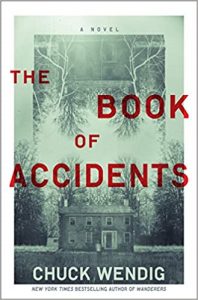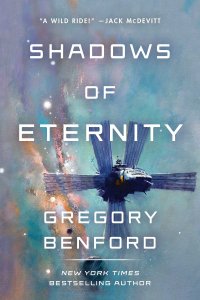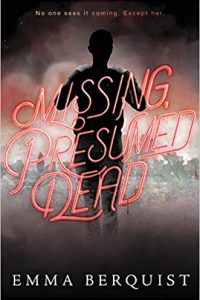Gabino Iglesias Reviews The Book of Accidents by Chuck Wendig
 The Book of Accidents, Chuck Wendig (Del Rey 978-0-399-18213-6, $28.99, 544pp, hc) July 2021. Cover by Fritz Metsch.
The Book of Accidents, Chuck Wendig (Del Rey 978-0-399-18213-6, $28.99, 544pp, hc) July 2021. Cover by Fritz Metsch.
More than about being great, writing is about consistently getting better, and Chuck Wendig’s latest, The Book of Accidents, shows that he’s not only great; he’s also really good at improving. A touching narrative about trauma, magic, and traveling to and from a series of collapsing alternate dimensions, The Book of Accidents is a horror novel that brings some of the best elements of literary fiction and science fiction to play while telling a story focused on the microcosm of a family of three that eventually morphs into a tale where the entire world hangs in the balance.
Nathan grew up in the shadow of an abusive father in country home in rural Pennsylvania. After he left, he made a life of his own, focused on not being like his father, and never told his wife and son about the abuse he suffered. When Nathan’s father dies from cancer, Nathan inherits the family home. Between their financial situation and their son Oliver’s struggles with life in the city, Nathan and his wife Maddie decide to move into the house instead of selling it. Unfortunately, the house is very close to a place where the division between worlds is thin, and the family soon starts experiences things. For Maddie, an artist who constructs sculptures from various materials, an encounter she had when she was a little girl making dolls in her bedroom ties her to her new reality. For Oliver, his ability to empathize and his gift for seeing and feeling the pain of others place him in a crucial role in someone’s plan to end the world. Finally, for Nathan, the abuse he suffered and the evil that has seeped into the place where he was born – and the hunger of a mine that’s at once a constant across dimensions and a sacrificial altar – push him into an alternate reality he must fight to come back from. At once a narrative about a haunted place, an exploration of how pain shapes us, and a story about dark magic and sinister agendas, The Book of Accidents is a horror novel that pushes against the boundaries of the genre and shows that Wendig is one of the most entertaining voices in contemporary fiction.
The Book of Accidents works on many levels, and it does so because Wendig brings a lot into a single novel and even created a mythology that feeds into the narrative. Nathan, Maddie, and Oliver are at the core of the story, but there are many supporting characters that play important roles and that make the novel feel at once real and complete. Also, the presence of Edmund Walker Reese, known as the Ramble Rocks killer, across time and space grants the narrative an additional level of darkness that goes above and beyond demons and apparitions.
That this is a dark book about dark things is clear from the start. In fact, Nathan’s words to his father’s lawyer set the tone for some of what’s to come: “I was hoping it’d be cancer. A crawling, steady cancer, too, not fast like pancreatic. Something that eats him up from the inside sure as he ate up our family. Cancer for cancer, tit for tat.” Despite that oppressive, ever-present combination of trauma, loneliness, fear, and suppressed pain, this novel has a shining heart in which love and sacrifice manage to eclipse all the horrors Wendig talks about, and there are many of those. In fact, many real horrors appear in the pages of this novel, and their impact is felt as much as that of the fictional ones, but the author manages to speak about real life without sounding preachy. When Oliver sees things, readers see those things, and it’s impossible to remain impassive in the face of them: “Animals dead and rotting in a field. Flies on a dead girl’s face. Thin, sick captives in raggedy pajamas pressed against the wire at a concentration camp. Men in ditches, trampled by horseback. A soldier in a trench struggling to shove a gas mask on his face as his skin bubbles and his eyes run like egg yolks down his face. Starving children, bellies swollen. Women loaded into a van with sacks over their heads.” The visions Oliver experiences go on and on, and they show that reality is often far more horrific than fiction.
While there is a lot of death, fear, and abuse in the pages of The Book of Accidents – _a title that is also a thing in the story – reading it is also a lot of fun. From unexpected bursts of humor and a look at high school that includes bullies and playing D&D, to drinking with friends and products from other dimensions, Wendig perfectly mixes together the lives of his characters with the evil that lurks around them and the entities that want to end the world. Also, the author had fun writing this, and that shines through. For fans of horror fiction, there are plenty of little details here that push the book into must-read territory. Two of them, both of which show up time and again, are the history of Reese and his supernatural death, and tips of the hat to horror author Paul Tremblay, which include a mention of the “cabin at the end of the world.”
The Book of Accidents is about a family fighting something much bigger than them while also struggling with their personal demons. It’s a wildly entertaining narrative about entropy, death, and the most horrible things humanity can do, which balances things out by showing the power of love, family, and friendship. Wendig is already a household name, but he’s not resting of his laurels, and this one might just be his best book yet.
Gabino Iglesias is a writer, journalist, professor, and book reviewer living in Austin TX. He is the author of Zero Saints and Coyote Songs and the editor of Both Sides. His work has been nominated to the Bram Stoker and Locus Awards and won the Wonderland Book Award for Best Novel in 2019. His short stories have appeared in a plethora of anthologies and his non-fiction has appeared in the New York Times, the Los Angeles Times, and CrimeReads. His work has been published in five languages, optioned for film, and praised by authors as diverse as Roxane Gay, David Joy, Jerry Stahl, and Meg Gardiner. His reviews appear regularly in places like NPR, Publishers Weekly, the San Francisco Chronicle, Criminal Element, Mystery Tribune, Vol. 1 Brooklyn, the Los Angeles Review of Books, and other print and online venues. He’s been a juror for the Shirley Jackson Awards twice and has judged the PANK Big Book Contest, the Splatterpunk Awards, and the Newfound Prose Prize. He teaches creative writing at Southern New Hampshire University’s online MFA program. You can find him on Twitter at @Gabino_Iglesias.
This review and more like it in the August 2021 issue of Locus.
 While you are here, please take a moment to support Locus with a one-time or recurring donation. We rely on reader donations to keep the magazine and site going, and would like to keep the site paywall free, but WE NEED YOUR FINANCIAL SUPPORT to continue quality coverage of the science fiction and fantasy field.
While you are here, please take a moment to support Locus with a one-time or recurring donation. We rely on reader donations to keep the magazine and site going, and would like to keep the site paywall free, but WE NEED YOUR FINANCIAL SUPPORT to continue quality coverage of the science fiction and fantasy field.
©Locus Magazine. Copyrighted material may not be republished without permission of LSFF.





